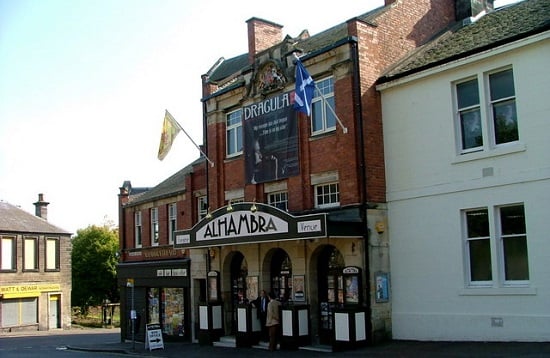
Alhambra Theatre in Dunfermline, pictured here in 2010, will undergo ventilation upgrades
Photo: Dave Ferguson
‘No evidence’ of Covid transmission in well-ventilated, socially distanced spaces
The Government has permitted venues to open with up to 50% capacity from early December. What does the science say?
There is currently "no evidence" of coronavirus transmission in well-ventilated spaces where everyone is at least two metres apart, Government scientists say.
The most recent evidence from the Scientific Advisory Group for Emergencies (SAGE) says it has a medium level of confidence that potentially infectious aerosols cannot be transmitted from "far field".
Ventilation is an "important mitigating measure" against long-range aerosol transmission, although it is not likely to reduce short-range trasmission, or transmission via surfaces.
SAGE recommends other mitigations such as reducing the duration of risky activities and wearing masks – requirements the Government has not imposed on the arts and cultural sector as it looks to resume in-person performances.
READ MORE:
- Many venues could be made safe for capacity audiences, SAGE report suggests
- SAGE report illustrates risk of non-distanced shows
These findings lend context to Culture Secretary Oliver Dowden's announcement on Monday (November 23) that theatres and other arts venues in areas with lower coronavirus rates can reopen at up to 50% capacity with social distancing when the national lockdown ends on December 2.
But they also raise questions about how many venues can reopen safely – or whether they can at all.
SAGE says that activities that generate high levels of aerosol such as singing and loud speaking "are likely to pose the greatest risk" of coronavirus transmission.
"In some spaces even enhanced ventilation may not fully mitigate this risk."
The group's latest on ventilation also cautions that upping occupancy without improving ventilation increases the probability of airborne transmission by fourfold.
The risk of exposure may be higher still if a space's occupants are less than two metres apart, it says.
Ventilation matters
The diversity of cultural buildings presents a challenge to ensuring adequate ventilation. Some have 'comfort cooling' systems that simply recirculate air, which could be contaminated, while others take the 'natural' route of opening the doors to air out the auditorium between shows.
New ventilation systems can be costly. Aberdeen music venue Krakatoa has fundraised more than £15,000 to finance £30,000 worth of ventilation upgrades so it can hold gigs safely.
The Theatres Trust has given grants to London's Hampton Hill Theatre and the Alhambra Theatre in Dunfermline, Scotland, to improve their ventilation as part of a scheme to get theatres ready to reopen.
"Testing of ventilation systems and alternative air purification technologies would help ascertain to what extent these, along with other mitigating measures such as masks and screens, might allow theatres to safely welcome fuller audiences," the trust said in a statement to ArtsProfessional.
It approached smaller theatres last month to survey how many had mechanical ventilation systems, which SAGE says can be run at a higher rate to make spaces safer.
However, the Theatres Trust was unable to say how many theatres it believed had adequate ventilation to reopen and how many needed further investment.
SAGE says higher density, multi-occupant spaces with ventilation that doesn't meet recent design standards are riskiest and should be a priority for improvement.
"The effectiveness of ventilation in many environments is strongly influenced by user behaviour. Clear messaging and guidelines will be needed to improve understanding on the reasons why good ventilation is important and how to effectively operate ventilation systems or achieve good natural ventilation."
Future options
New technology may offer hope to the sector: HEPA and UVC air cleaning filters "may be a viable solution in spaces where it is difficult to provide good ventilation," SAGE says.
UV-C air filters, which use invisible UV light to purify the air, may be able to kill the virus but more research is needed to confirm their effectiveness.
Music Venue Trust has been working on a 'Test, Clean, Prevent' model of coronavirus prevention: a multi-layered approach combining rapid testing, systems to reduce potentially infectious pathogens, and anti-viral measures such as hand sanitiser and deep cleaning.
CEO Mark Davyd told ArtsProfessional that installing high capacity ventilation was likely to cost much more than "equally effective measures" such as UVC filtration.
"The whole range of Test, Clean, Prevent measures… can be delivered for less than £15,000 per venue.
"That is not to say that ventilation does not have an important role to play, but reflecting the layout and capacity of grassroots music venue spaces, we believe that UVC may present a more effective pathogen reduction model, whilst also providing a more cost effective option."
Thermal imaging cameras that detect audience members with high temperatures may also be a cost effective risk reduction method. Theatres Trust has funded The Roundhouse in London to purchase one of these, saying it is "emerging as best practice for venues of this size".
Join the Discussion
You must be logged in to post a comment.